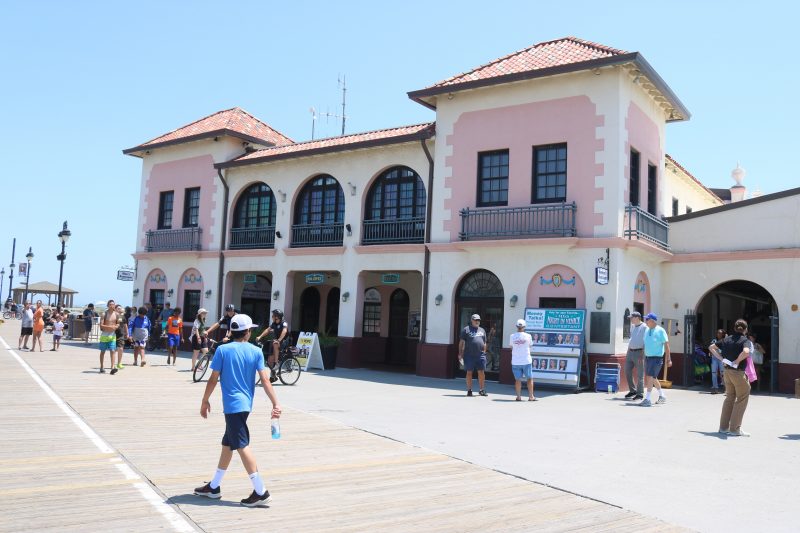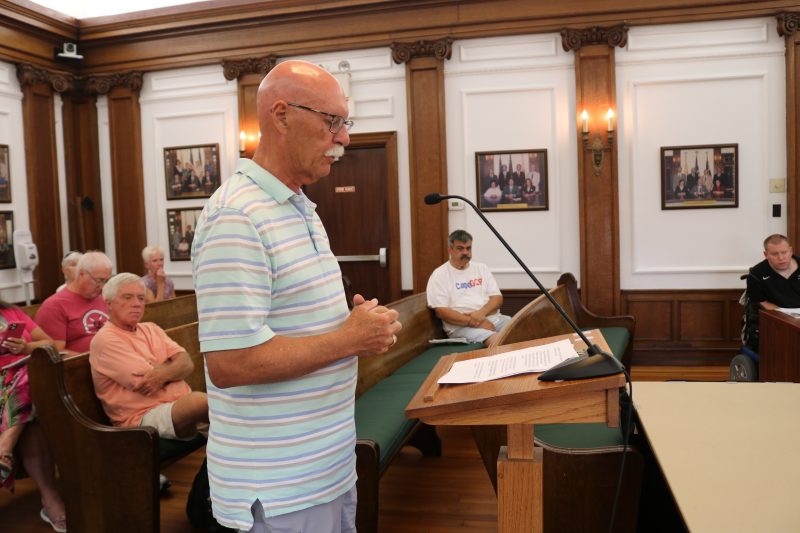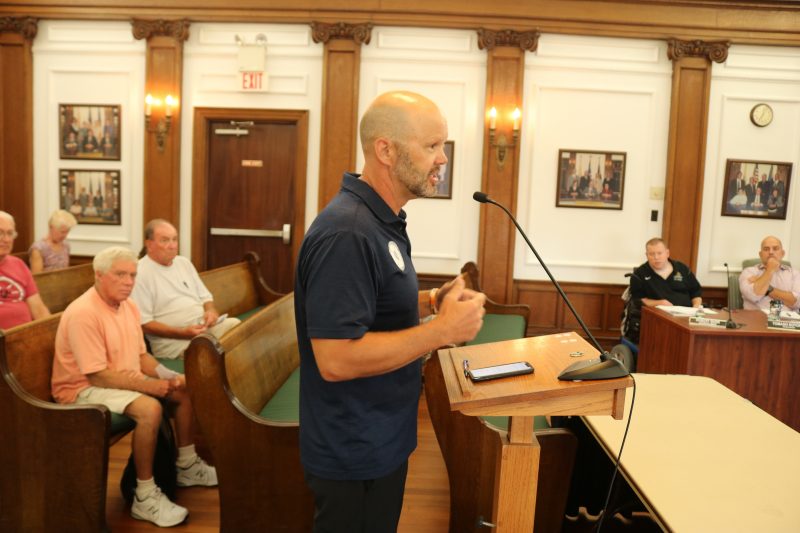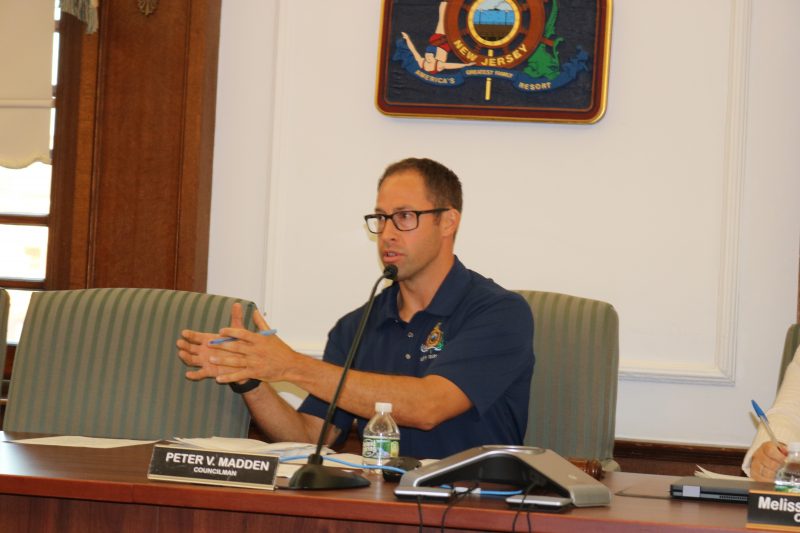Rick Bernardini, chairman of the Ocean City Environmental Commission, tells Council he wants the debate over artificial turf decided in a public referendum.
 By DONALD WITTKOWSKI
A turf war of sorts broke out at a City Council meeting Thursday night.
The turf in this case is the artificial playing surface that Ocean City plans to install on a heavily used athletic field at Tennessee Avenue in place of the natural grass that is there now.
The issue brought impassioned pleas from both supporters and opponents of the plan. Supporters included Ocean City High School head football coach Kevin Smith and girls' lacrosse coach Lesley Graham. Among those raising objections was Rick Bernardini, chairman of the Ocean City Environmental Commission.
After listening to comments from the public, City Council voted 6-0 to approve a nearly $11 million funding package for a series of capital projects that includes installing artificial turf at the Tennessee Avenue athletic complex.
“It just seems overwhelming the number of people who want this,” Councilman Jody Levchuk said of the public sentiment in favor of artificial turf.
Levchuk and other Council members said they carefully considered arguments both in favor and against artificial turf. They noted that extensive research has been done that indicates artificial turf is safe.
“There are thousands of them,” Councilman Bob Barr said of the number of stadiums and playing fields worldwide that have artificial turf.
The Council members also said that most of the parents, coaches and students they spoke to leading up to Thursday’s meeting were strongly in favor of having artificial turf at the Tennessee Avenue complex.
By DONALD WITTKOWSKI
A turf war of sorts broke out at a City Council meeting Thursday night.
The turf in this case is the artificial playing surface that Ocean City plans to install on a heavily used athletic field at Tennessee Avenue in place of the natural grass that is there now.
The issue brought impassioned pleas from both supporters and opponents of the plan. Supporters included Ocean City High School head football coach Kevin Smith and girls' lacrosse coach Lesley Graham. Among those raising objections was Rick Bernardini, chairman of the Ocean City Environmental Commission.
After listening to comments from the public, City Council voted 6-0 to approve a nearly $11 million funding package for a series of capital projects that includes installing artificial turf at the Tennessee Avenue athletic complex.
“It just seems overwhelming the number of people who want this,” Councilman Jody Levchuk said of the public sentiment in favor of artificial turf.
Levchuk and other Council members said they carefully considered arguments both in favor and against artificial turf. They noted that extensive research has been done that indicates artificial turf is safe.
“There are thousands of them,” Councilman Bob Barr said of the number of stadiums and playing fields worldwide that have artificial turf.
The Council members also said that most of the parents, coaches and students they spoke to leading up to Thursday’s meeting were strongly in favor of having artificial turf at the Tennessee Avenue complex.
 The Ocean City Music Pier is among the public buildings that will receive improvements.
Besides the artificial turf, the nearly $11 million bond ordinance funds a series of big-ticket projects throughout the city, including the continued dredging of shallow lagoons along the back bays and renovations to several major buildings.
According to the funding breakdown, $2.8 million will go for repairs or renovations at a number of key public buildings and facilities. They include a new roof for the Ocean City Community Center, renovations to the Beach Patrol headquarters, stage lighting for the Music Pier and a new heating and air-conditioning system for the Historical Museum.
Separately, $2.3 million will fund the construction and renovation of public facilities and grounds, including citywide landscaping upgrades, irrigation improvements, fence repairs, the artificial turf at Tennessee Avenue and a new scoreboard and bleachers at the high school’s Carey Field stadium.
Nearly $1.5 million will be used to buy new vehicles and equipment. Among other things, the city will purchase a police patrol boat and two new heavy-duty dump trucks for work on the beaches and for snow removal.
The funding plan also includes $2.5 million to continue the city’s multiyear dredging program for the back bays and lagoons. The city has been clearing out sediment-choked lagoons and channels to improve boating, swimming and the bayfront marinas.
But all of the capital projects were overshadowed by debate over the artificial turf. With Council’s approval of the capital projects, the Tennessee Avenue complex will now join the high school’s Carey Stadium as the only athletic fields in town that have artificial turf.
Supporters said artificial turf would be a better surface to play on than the occasionally soggy grass that is on the Tennessee Avenue field now. But opponents warned of potential serious environmental drawbacks from both the artificial turf and the chemicals that would be needed to clean the surface.
The Ocean City Music Pier is among the public buildings that will receive improvements.
Besides the artificial turf, the nearly $11 million bond ordinance funds a series of big-ticket projects throughout the city, including the continued dredging of shallow lagoons along the back bays and renovations to several major buildings.
According to the funding breakdown, $2.8 million will go for repairs or renovations at a number of key public buildings and facilities. They include a new roof for the Ocean City Community Center, renovations to the Beach Patrol headquarters, stage lighting for the Music Pier and a new heating and air-conditioning system for the Historical Museum.
Separately, $2.3 million will fund the construction and renovation of public facilities and grounds, including citywide landscaping upgrades, irrigation improvements, fence repairs, the artificial turf at Tennessee Avenue and a new scoreboard and bleachers at the high school’s Carey Field stadium.
Nearly $1.5 million will be used to buy new vehicles and equipment. Among other things, the city will purchase a police patrol boat and two new heavy-duty dump trucks for work on the beaches and for snow removal.
The funding plan also includes $2.5 million to continue the city’s multiyear dredging program for the back bays and lagoons. The city has been clearing out sediment-choked lagoons and channels to improve boating, swimming and the bayfront marinas.
But all of the capital projects were overshadowed by debate over the artificial turf. With Council’s approval of the capital projects, the Tennessee Avenue complex will now join the high school’s Carey Stadium as the only athletic fields in town that have artificial turf.
Supporters said artificial turf would be a better surface to play on than the occasionally soggy grass that is on the Tennessee Avenue field now. But opponents warned of potential serious environmental drawbacks from both the artificial turf and the chemicals that would be needed to clean the surface.
 Rick Bernardini, chairman of the Ocean City Environmental Commission, tells Council he wants the debate over artificial turf decided in a public referendum.
Bernardini, chairman of the Environmental Commission, was unsuccessful in his attempts to have Council postpone a vote to give the city more time to study the pros and cons of artificial turf. He maintained that artificial turf could possibly cause harm to the environmentally sensitive wetlands surrounding the Tennessee Avenue complex.
Bernardini told Council that the Environmental Commission had an “active discussion” about artificial turf during its Aug. 9 meeting. As part of his comments, Bernardini suggested that the issue should be decided by a public referendum.
Donna Moore, a local environmental advocate, joined Bernardini and other opponents in expressing fears about possible environmental damage. Moore said the artificial turf itself may be toxic, as well as the chemicals that will be used to clean it.
Supporters, though, said artificial turf will be far better for the athletes. They believe it will result in fewer injuries to the athletes because it is a more stable playing surface than natural grass.
Smith, the high school’s head football coach, called artificial turf a “tremendous idea” for Tennessee Avenue. He said the artificial turf surface at the high school’s Carey Stadium field has proved to be a great success.
Carey Stadium is so popular that it has led to overcrowding among the sports programs that use the complex, Smith noted. Artificial turf at Tennessee Avenue would help to alleviate the overcrowding because more sports programs will want to use that site, he said.
Smith also said that an artificial turf field at Tennessee Avenue would help to attract more sports camps to Ocean City, generating extra revenue for the town in the process.
Rick Bernardini, chairman of the Ocean City Environmental Commission, tells Council he wants the debate over artificial turf decided in a public referendum.
Bernardini, chairman of the Environmental Commission, was unsuccessful in his attempts to have Council postpone a vote to give the city more time to study the pros and cons of artificial turf. He maintained that artificial turf could possibly cause harm to the environmentally sensitive wetlands surrounding the Tennessee Avenue complex.
Bernardini told Council that the Environmental Commission had an “active discussion” about artificial turf during its Aug. 9 meeting. As part of his comments, Bernardini suggested that the issue should be decided by a public referendum.
Donna Moore, a local environmental advocate, joined Bernardini and other opponents in expressing fears about possible environmental damage. Moore said the artificial turf itself may be toxic, as well as the chemicals that will be used to clean it.
Supporters, though, said artificial turf will be far better for the athletes. They believe it will result in fewer injuries to the athletes because it is a more stable playing surface than natural grass.
Smith, the high school’s head football coach, called artificial turf a “tremendous idea” for Tennessee Avenue. He said the artificial turf surface at the high school’s Carey Stadium field has proved to be a great success.
Carey Stadium is so popular that it has led to overcrowding among the sports programs that use the complex, Smith noted. Artificial turf at Tennessee Avenue would help to alleviate the overcrowding because more sports programs will want to use that site, he said.
Smith also said that an artificial turf field at Tennessee Avenue would help to attract more sports camps to Ocean City, generating extra revenue for the town in the process.
 Ocean City High School head football coach Kevin Smith calls the plan for artificial turf at the Tennessee Avenue field a "tremendous idea."
Graham, the high school girls' lacrosse coach, told Council that her players prefer artificial turf. She said the grass playing field at Tennessee Avenue tends to get soggy, which forces the lacrosse team to move its practices inside.
Graham said that as a coach and mother, she is a “firm believer” in giving Ocean City’s athletes the best possible playing surface.
In other business Thursday, Council was asked to resume livestreaming its meetings over Zoom to give residents another option for keeping up with city business.
Like other communities, Ocean City held Zoom meetings during the height of the pandemic when there were restrictions on indoor crowds. Then the city transitioned into a combination of in-person and Zoom meetings as the pandemic began to wane. Last month, it ended the Zoom sessions in favor of completely in-person meetings.
Council President Peter Madden said no final decisions have been made whether to bring back the Zoom connections now that residents are asking for them again.
Madden, however, stressed that whatever Council ultimately decides, it will do what is best “for the whole, not the few.”
“This is a business meeting. It’s not a made-for-TV soap opera,” he said of the seriousness of the Council proceedings.
Madden also pointed out that members of the public still have plenty of opportunities to interact with the governing body, including attending the Council meetings in-person or by email, texts or simple phone calls “at any time.”
Ocean City High School head football coach Kevin Smith calls the plan for artificial turf at the Tennessee Avenue field a "tremendous idea."
Graham, the high school girls' lacrosse coach, told Council that her players prefer artificial turf. She said the grass playing field at Tennessee Avenue tends to get soggy, which forces the lacrosse team to move its practices inside.
Graham said that as a coach and mother, she is a “firm believer” in giving Ocean City’s athletes the best possible playing surface.
In other business Thursday, Council was asked to resume livestreaming its meetings over Zoom to give residents another option for keeping up with city business.
Like other communities, Ocean City held Zoom meetings during the height of the pandemic when there were restrictions on indoor crowds. Then the city transitioned into a combination of in-person and Zoom meetings as the pandemic began to wane. Last month, it ended the Zoom sessions in favor of completely in-person meetings.
Council President Peter Madden said no final decisions have been made whether to bring back the Zoom connections now that residents are asking for them again.
Madden, however, stressed that whatever Council ultimately decides, it will do what is best “for the whole, not the few.”
“This is a business meeting. It’s not a made-for-TV soap opera,” he said of the seriousness of the Council proceedings.
Madden also pointed out that members of the public still have plenty of opportunities to interact with the governing body, including attending the Council meetings in-person or by email, texts or simple phone calls “at any time.”
 City Council President Peter Madden says no final decisions have been made on whether to resume Zoom sessions.
City Business Administrator George Savastano argued against resuming the Zoom sessions. Like Madden, he said members of the public have ample opportunity to participate in the local government without having Zoom as another option.
“This government is transparent,” Savastano said.
Savastano indicated he did not want Zoom to become a distraction. He called the Zoom sessions “more hurtful than helpful” when Council is trying to conduct serious meetings involving important business.
Ocean City is not alone in ending Zoom for its Council meetings. Savastano said Ocean City surveyed 21 other towns that once offered Zoom as an option during the peak of the pandemic. He said only three of them still have Zoom.
Suzanne Hornick, an Ocean City resident who has been urging Council to bring back Zoom, said more people will participate if they can go online to watch the meetings.
Hornick said the Zoom meetings are a key element for having a more transparent local government that encourages public participation.
“In fact, some meetings had record participants,” Hornick said of Council’s Zoom sessions that were held during the height of the pandemic.
City Council President Peter Madden says no final decisions have been made on whether to resume Zoom sessions.
City Business Administrator George Savastano argued against resuming the Zoom sessions. Like Madden, he said members of the public have ample opportunity to participate in the local government without having Zoom as another option.
“This government is transparent,” Savastano said.
Savastano indicated he did not want Zoom to become a distraction. He called the Zoom sessions “more hurtful than helpful” when Council is trying to conduct serious meetings involving important business.
Ocean City is not alone in ending Zoom for its Council meetings. Savastano said Ocean City surveyed 21 other towns that once offered Zoom as an option during the peak of the pandemic. He said only three of them still have Zoom.
Suzanne Hornick, an Ocean City resident who has been urging Council to bring back Zoom, said more people will participate if they can go online to watch the meetings.
Hornick said the Zoom meetings are a key element for having a more transparent local government that encourages public participation.
“In fact, some meetings had record participants,” Hornick said of Council’s Zoom sessions that were held during the height of the pandemic.